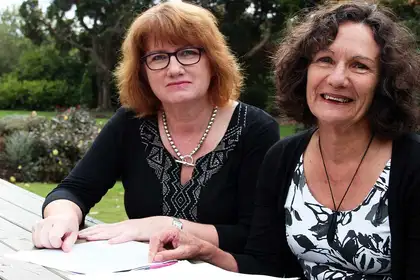
School of Psychology’s Professor Fiona Alpass and Professor Christine Stephens of Massey’s Health and Ageing Research Team.
Five Massey University research projects have received a combined $9.85 million to propel their pioneering ideas in science and society.
The projects include work into managing the ageing workforce, utilising Māori land knowledge, the development of a new 3D printer, precision fertiliser application and wastewater treatment improvements.
The funding comes from the Ministry of Business, Innovation and Employment’s (MBIE) 2017 Endeavour Fund, announced today by Science and Innovation Minister Paul Goldsmith.
Sixty-eight new science research projects were funded totalling $248 million. The Fund invests in research that has high potential to positively transform New Zealand’s future economic performance, the sustainability and integrity of the environment, and to help strengthen society.
Research programmes
The fund is split into two initiatives, with the larger supporting well-formed research ideas, which have high potential to positively transform areas of future value, growth or critical need in New Zealand.
The first successful project was proposed by Massey’s Health and Ageing Research Team (HART) and will receive $3,996,875 for their research, ‘Maximising workforce participation for older New Zealanders: Opportunities, Challenges and Prospects’. Led by Professor Fiona Alpass and Professor Christine Stephens of the School of Psychology, HART has secured $11,326,400 in funding for research into the health and wellbeing of older persons in New Zealand.
The project seeks to answer the crucial question for an ageing population: ‘How can government, employers and workers maximise older New Zealanders’ participation in the workforce?’
The second successful project ‘He Tātai Whenua: A Te Ao Māori landscape classification’ will be co-led by Associate Professor Jonathan Procter and Mr Hone Morris. The research receives $2,870,000 to integrate traditional indigenous knowledge of the land into existing geographic information systems for use in improved environmental reporting and monitoring.
Associate Professor Procter, of the Institute of Agriculture and Environment says the work is long overdue. “Historic and contemporary Māori elicitation or interpretation of the environment is well recognised yet remains qualitative and is also not apparent in existing scientific landscape classifications. There is a critical need to document this cultural knowledge in order to participate in future scientific and environmental benefits.”
Smart ideas initiative
The other three projects were awarded through the ‘Smart Ideas’ initiative, which supports innovative research projects that have a high potential to benefit New Zealand and are eligible for between $400,000 to $1 million. All three research projects are led by the University’s School of Engineering and Advanced Technology.
Professor Andrew Shilton will lead the project ‘Wastewater Treatment 'Advanced Extraction Modules': De-risking to enable end-user uptake’ which received $989,594. The project seeks to benefit small communities throughout New Zealand by enabling comprehensive waste water treatment upgrades without major upfront capital costs.
Professor Clive Davies will lead a team on the project ‘Design and manufacture of controlled release fertiliser system for precision nutrient delivery’, which received $999,327. The research proposes to develop a controlled release fertiliser technology to increase agricultural productivity and reduce the environmental impact of agricultural activity.
Associate Professor Johan Potgieter will lead a team on the project ‘Electro spun Bioprinting Technology in the Production of Complex Collagen Tissues’ which received $998,532. Their research proposes to develop a 3D printing machine designed for use in the ever-growing medical transplant industry.